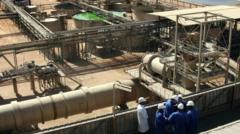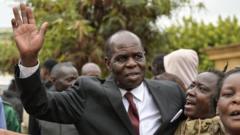Kenyan President William Ruto has sparked outrage among citizens by announcing his intention to construct a large church at State House, estimated to cost $9 million. Critics argue this blurs the line between state and religion at a time when many Kenyans are grappling with the rising cost of living. The Atheists Society of Kenya is considering legal action, claiming the project promotes Christian nationalism.
Controversy Erupts as Kenya’s President Ruto Announces Church Construction at State House

Controversy Erupts as Kenya’s President Ruto Announces Church Construction at State House
President William Ruto is facing backlash for unveiling plans to build a $9 million church at the presidential office, igniting debates on church-state separation amid rising economic challenges.
Kenyan President William Ruto has announced plans to build a grand church at the presidential residence in Nairobi, a project he claims he will fund personally, costing an estimated $9 million. The announcement has incited anger among many Kenyans concerned about the relationship between church and state, particularly given the nation’s secular constitution. "I am not going to ask anyone for an apology for building a church. The devil might be angry and can do what he wants," Ruto declared during a meeting at State House on Friday, further intensifying tensions among citizens already frustrated with his leadership approach.
Architectural designs published by the Daily Nation reveal the church will accommodate 8,000 people and feature stained glass windows. Critics, including the Atheists Society of Kenya, view the endeavor as an affront to democracy and are threatening legal action to halt construction. They argue that the government should represent all Kenyans, regardless of faith, and not prioritize one religious group over others. The group's leader, Harrison Mumia, condemned the initiative, stating, "We view this action as anti-democratic and a promotion of Christian nationalism by President Ruto."
William Ruto, often dubbed "deputy Jesus" for his evangelical Christian persona, has previously been known for integrating religious attitudes into his political image. While approximately 85% of Kenya's population practices Christianity, the significant presence of Muslims and other faiths raises concerns about the church's construction in a public space. Nairobi's Catholic Archbishop, Philip Anyolo, has called for transparency regarding the project, emphasizing that such a structure should not favor a particular denomination.
As Kenya grapples with economic difficulties, the timing of the announcement raises pressing questions about priorities in the leadership. Given that there is no mosque or temple at the presidency, the move may further alienate non-Christian communities in the country. President Ruto's church project continues to be a focal point of debate as Kenyans respond to the intertwining of governance and religion in their political landscape.




















